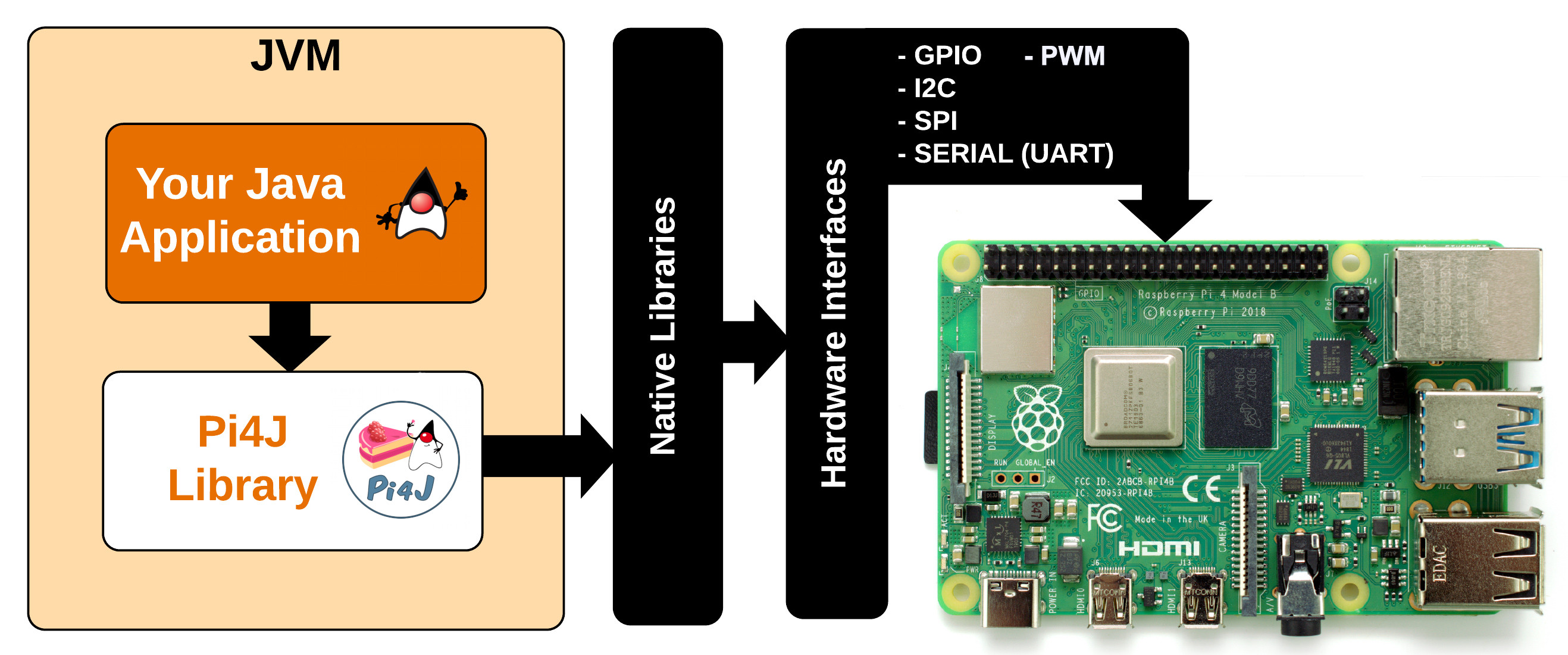Project website: pi4j.com.
This project is intended to provide a friendly object-oriented I/O API and implementation libraries for Java Programmers to access the full I/O capabilities of the Raspberry Pi platform. This project abstracts the low-level native integration and interrupt monitoring to enable Java programmers to focus on implementing their application business logic.
- Pi4J V2 Discussions: github.com/Pi4J/pi4j-v2/discussions
- Pi4J V2 issues: github.com/Pi4J/pi4j-v2/issues
Builds are available from:
- Release builds from Maven Central
- Snapshot builds from Sonatype OSS
- Pi4J Downloads
- APT/PPA Package Repository downloads
When you want to use Pi4J in your project, you should definitely check out the Pi4J website where you can find a lot of information and many examples!
For example, for a minimal example to blink a LED (fully explained here), you need to import the dependencies and use this code:
var pi4j = Pi4J.newAutoContext();
var led = pi4j.digitalOutput().create(PIN_LED);
while (true) {
if (led.state() == DigitalState.HIGH) {
led.low();
} else {
led.high();
}
Thread.sleep(500);
}For full description of the code structure, how to compile... see the "About the code" on our website.
Starting with the Pi4J 2.0 builds, the Pi4J project is prioritizing focus on providing Java programs access, control and communication with the core I/O capabilities of the Raspberry Pi platform.
Read all about it on pi4j.com: "What’s New in 2.0?".
The Pi4J V2 codebase can be built using Apache Maven 3.6.x. and Java JDK 11. The following command can be used to build the Pi4J V2 JARs:
mvn clean install
Pi4J V2 also includes native libraries that will need to be compiled if you are modifying any native code.
Most users will never need to compile the native libraries as these artifacts are automatically downloaded
when building the Pi4J JARs from Maven repositories. One of the following commands can be used to build
the Pi4J V2 JARs and Native Libraries:
mvn clean install -Pnative
mvn clean install -Pnative,docker
NOTE: A comprehensive set of build instructions can be found in the Pi4J V2 Documentation.
If you have and idea to extend and improve Pi4J, please first create a ticket to discuss how it fits in the project and how it can be implemented.
If you find a bug, create a ticket, so we are aware of it and others with the same problem can contribute what they already investigated. And the quickest way to get a fix? Try to search for the cause of the problem or even better provide a code fix!
You want to become a member of the Pi4J-team? Great idea! Send a short message to [email protected] with your experience, ideas, and what you would like to contribute to the project.
- Releases
- V1: github.com/Pi4J/pi4j-v1/releases (archived)
- V2: github.com/Pi4J/pi4j-v2/releases
- Source Code:
- V1: github.com/Pi4J/pi4j-v1/branches (archived)
- V2: github.com/Pi4J/pi4j-v2/branches
Pi4J Version 2.0 and later is licensed under the Apache License, Version 2.0 (the "License"); you may not use this file except in compliance with the License. You may obtain a copy of the License at: http://www.apache.org/licenses/LICENSE-2.0
Unless required by applicable law or agreed to in writing, software distributed under the License is distributed on an "AS IS" BASIS, WITHOUT WARRANTIES OR CONDITIONS OF ANY KIND, either express or implied. See the License for the specific language governing permissions and limitations under the License.
Copyright (C) 2012-2024 Pi4J










